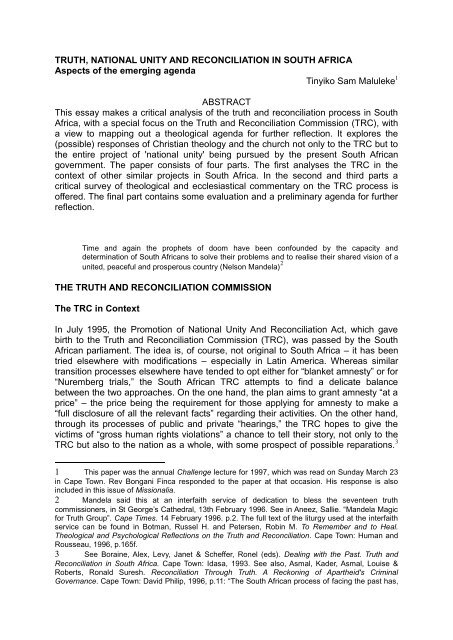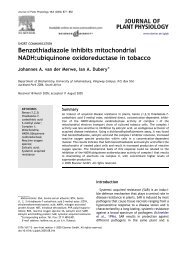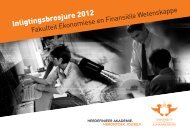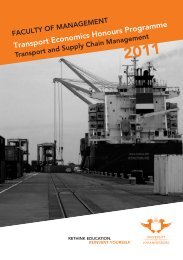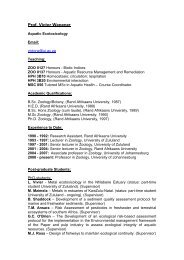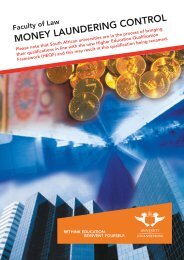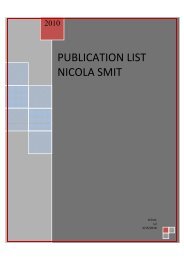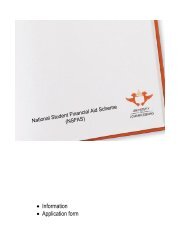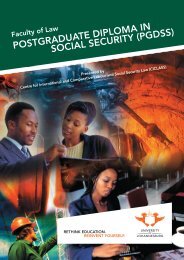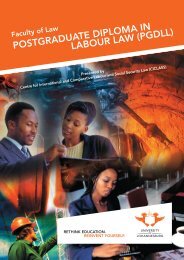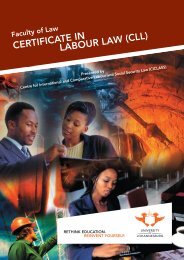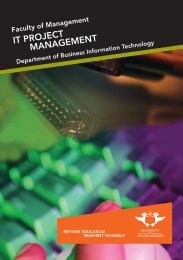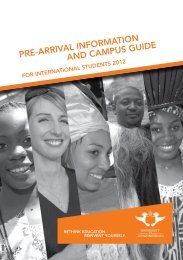Truth, National Unity and Reconciliation in South Africa: A aspects of ...
Truth, National Unity and Reconciliation in South Africa: A aspects of ...
Truth, National Unity and Reconciliation in South Africa: A aspects of ...
Create successful ePaper yourself
Turn your PDF publications into a flip-book with our unique Google optimized e-Paper software.
Guided by the provisions <strong>of</strong> the Promotion <strong>of</strong> <strong>National</strong> <strong>Unity</strong> <strong>and</strong> <strong>Reconciliation</strong> Act,we may isolate certa<strong>in</strong> terms, concepts <strong>and</strong> categories to help us evaluate the vision,m<strong>and</strong>ate <strong>and</strong> objectives <strong>of</strong> both the Act <strong>and</strong> the TRC itself.Gross Violation <strong>of</strong> Human RightsThe TRC is required to <strong>in</strong>vestigate, as fully as possible, the nature, causes <strong>and</strong>extent <strong>of</strong> what the Act terms “gross violations <strong>of</strong> human rights.” But what constitutesgross human right violations? Can we assume that the very notion <strong>of</strong> human rightspresupposed <strong>in</strong> the term is either feasible or acceptable <strong>in</strong> our situation? 10 Anobvious problem with the category <strong>and</strong> its def<strong>in</strong>ition is the question whether it ispossible to isolate among the oppressed those who have been grossly violated, asopposed to those who were m<strong>in</strong>imally violated, <strong>in</strong> the light <strong>of</strong> the fact that Apartheidwas declared a crime aga<strong>in</strong>st humanity? It must be noted “that the <strong>in</strong>justice, the guilt,the suffer<strong>in</strong>g <strong>in</strong> <strong>South</strong> <strong>Africa</strong> were very much greater than what was caused by thesespecific <strong>and</strong> serious human rights violations ... [therefore the whole] truth can neverbe told” 11 <strong>in</strong> the context <strong>of</strong> a commission.With its focus on gross violations <strong>of</strong> human rights, the TRC's pursuit for thetruth has serious limitations. 12 This approach tends to concentrate on the bloody <strong>and</strong>gruesome details <strong>of</strong> the activities <strong>of</strong> the “foot soldiers” who carried out <strong>in</strong>structions,without gett<strong>in</strong>g to the th<strong>in</strong>kers, planners <strong>and</strong> legitimisers <strong>of</strong> Apartheid's crim<strong>in</strong>alactivities, except by way <strong>of</strong> implication. To attract attention, such implication musthowever not only be extremely embarrass<strong>in</strong>g to the <strong>of</strong>ficials concerned, but it mustalso encompass the bloody <strong>and</strong> the gruesome. This has been the situation <strong>in</strong> thecase <strong>of</strong> the former m<strong>in</strong>ister <strong>of</strong> police, Adriaan Vlok, whose name has been mentioned<strong>in</strong> connection with, amongst other th<strong>in</strong>gs, the bomb<strong>in</strong>g <strong>of</strong> the <strong>South</strong> <strong>Africa</strong>n Council<strong>of</strong> Churches (SACC) <strong>of</strong>fices. He has recently applied for amnesty. But strictlyspeak<strong>in</strong>g a cab<strong>in</strong>et m<strong>in</strong>ister whose policies led to police shoot<strong>in</strong>g black children; auniversity pr<strong>of</strong>essor who defended Apartheid as an <strong>in</strong>telligent, rational <strong>and</strong> workablesystem, or a m<strong>in</strong>ister <strong>of</strong> education whose policies ensured that black education waspoor <strong>and</strong> under-f<strong>in</strong>anced, has “little” to disclose before the TRC. This is one <strong>of</strong> theth<strong>in</strong>gs that limits the ability <strong>of</strong> the TRC to serve a truly national <strong>and</strong> symbolic function.For unless those who did the th<strong>in</strong>k<strong>in</strong>g, plann<strong>in</strong>g <strong>and</strong> the lead<strong>in</strong>g can own up to theirroles, the chances that those who followed will do the same with honesty <strong>and</strong><strong>in</strong>tegrity are very slim.Yet, we must acknowledge that despite the limited nature <strong>of</strong> what the TRCseeks to probe, the <strong>in</strong>vestigation <strong>of</strong> gross human right violations may still serve an<strong>in</strong>formative, symbolic <strong>and</strong> ritual purpose for many <strong>South</strong> <strong>Africa</strong>ns – especially thosewho did not realise that there was someth<strong>in</strong>g seriously wrong go<strong>in</strong>g on. 1310 For example, Van Schalkwyk argues that while, “this 'universal' concept <strong>of</strong> human rights mayto some extent have allowed for some emancipation (<strong>of</strong> women) <strong>in</strong> highly <strong>in</strong>dustrialised countries, ithas left the women [<strong>and</strong> men] <strong>of</strong> the Third World <strong>in</strong> bondage”, Van Schalkwyk, Annalet. Review <strong>of</strong>Gnanadason, Aruna, Kanyoro, Musimbi; McSpadden, Lucia Ann (eds). 1996 Women, Violence <strong>and</strong>Nonviolent Change. Geneva: WCC. Missionalia 24:1 (April 1996), p.99.11 Smit, Dirkie J. “The truth <strong>and</strong> <strong>Reconciliation</strong> Commission ...” 1996, p.14 .12 I have not been able to f<strong>in</strong>d precise explanations <strong>and</strong> justification for the focus on “grossviolations <strong>of</strong> human rights” – not even <strong>in</strong> the Act itself. Without question<strong>in</strong>g its symbolic usefulness <strong>and</strong>its potential for trigger<strong>in</strong>g reconciliation, this specific focus on human rights violations is but one out <strong>of</strong>many other possible perspectives on <strong>South</strong> <strong>Africa</strong>'s past.13 Part <strong>of</strong> the reason for this narrow delimitation <strong>of</strong> scope is probably driven by the need to
Cut-Off DatesThe provision that 1 March 1960 be the date <strong>of</strong> commencement for activities to beprobed is probably also related to the need for clearly delimited frames <strong>of</strong> referenceas well as negotiations-<strong>in</strong>spired compromises. 14 Here aga<strong>in</strong>, it can be po<strong>in</strong>ted outthat 1960 is very late <strong>in</strong> the genealogy <strong>of</strong> oppression <strong>and</strong> dispossession <strong>of</strong> blackpeople. Was it not <strong>in</strong> 1913 that the <strong>in</strong>famous L<strong>and</strong> Act was passed, to ensure thatwhile the whites owned 87% <strong>of</strong> the l<strong>and</strong>, blacks could only share a paltry 13%? 15These <strong>and</strong> other questions can <strong>and</strong> have <strong>in</strong>deed been posed <strong>in</strong> relation to the choice<strong>of</strong> March 1960 16 to April 1994 as cut-<strong>of</strong>f dates for the TRC process.Amnesty vs ReparationThe Act further provides for “the grant<strong>in</strong>g <strong>of</strong> amnesty to persons who make fulldisclosure <strong>of</strong> all the relevant facts... 17 ” This has perhaps been one <strong>of</strong> the most difficult<strong>aspects</strong> <strong>of</strong> the Act for the victims <strong>of</strong> gross human violations – the fact that personswho make full disclosure can be pardoned just for tell<strong>in</strong>g “the truth.” It is significantthat the Act does not require the perpetrators to demonstrate any remorse or showany will<strong>in</strong>gness to make reparations for their actions. This is one <strong>of</strong> the reasons whythe TRC legislation has been described as weak. In terms <strong>of</strong> the Act, all that isrequired is for them to make a full disclosure 18 .Also, whereas the committee on amnesty has the power to grant amnesty, theRehabilitation <strong>and</strong> Reparations (R & R) committee – which deals with reparations forvictims – can only make recommendations to either the president or a parliamentaryst<strong>and</strong><strong>in</strong>g committee. It appears therefore that it is firmly with<strong>in</strong> the competencies <strong>of</strong>the commission to grant or not to grant amnesty to perpetrators but its h<strong>and</strong> is not sostrong <strong>in</strong> the case <strong>of</strong> reparations for the victims. 19 This means that while the TRC is“demarcate the core issues <strong>in</strong> the <strong>South</strong> <strong>Africa</strong>n case <strong>and</strong> particularly those which are politicallyfeasible” , see Du Toit, André, <strong>in</strong> Bora<strong>in</strong>e et al. op cit. p.131.14 Asmal, Kader et al.; op. cit. p.9.15 See, Mayende, Peter, “The L<strong>and</strong> Question: Prospects for the next millennium”. 1996.(Unpublished paper).16 Notable here is that while the commencement date <strong>of</strong> 1960 has neither been changed normuch debated, the cut-<strong>of</strong>f date for the process has been shifted from the orig<strong>in</strong>ally agreed date <strong>of</strong>December 1993 to May 1994. This was mostly due to pressure from the white right w<strong>in</strong>g groups,which cont<strong>in</strong>ued their acts <strong>of</strong> sabotage <strong>and</strong> kill<strong>in</strong>g <strong>in</strong> the run-up to, dur<strong>in</strong>g <strong>and</strong> after the 1994 elections.17 Statutes <strong>of</strong> the Republic ..., p.801.18 I have found the spirited arguments <strong>of</strong> Asmal et al. op. cit. p.17 unconv<strong>in</strong>c<strong>in</strong>g. They arguethat the Act leaves scope for “the creative discretion <strong>of</strong> the commission” to impose a “contritionrequirement” on the amnesty applicant. Furthermore, they argue that the commission may choose torequire an acknowledgement <strong>of</strong> sorrow on the part <strong>of</strong> a perpetrator seek<strong>in</strong>g amnesty because“apology is the most obvious form <strong>of</strong> reparation.” Their arguments are too stra<strong>in</strong>ed to be persuasive.What they cannot deny is the fact that the Act does not require contrition, sorrow or apology from theamnesty applicants, but only “full disclosure.” An even more recent article by the director <strong>of</strong> the TRC'sResearch Department confirms my view: “For many, not least the victims, this is not enough.Contrition <strong>and</strong> repentance are regarded as a basic m<strong>in</strong>imum. Reality, however, requires us to settlefor less”. Villa-Vicencio, Charles. “Reconcil<strong>in</strong>g our people”. Sunday Times. 23 February, 1997, p.2.19 Towards the end <strong>of</strong> 1996, the Rehabilitation <strong>and</strong> Reparations Committee was reported to be“develop<strong>in</strong>g proposals for Urgent Interim Reparation measures,” to be completed <strong>in</strong> March 1998 <strong>and</strong>to be presented to the President <strong>and</strong> f<strong>in</strong>ally to be tabled <strong>in</strong> parliament for approval. <strong>Truth</strong> Talk. Vol 1No 1. November. “Urgent Relief for Victims Proposed” ... 1996, p.2.
able to “f<strong>in</strong>alise” what it can <strong>of</strong>fer to amnesty applicants, it is unable to do the samefor victims. Beyond the complex arguments 20 about whether the TRC ought to begiven more judicial teeth so that it could adopt a “prosecution-centred” approach, ablanket-amnesty approach, etc., there is the feel<strong>in</strong>g that as th<strong>in</strong>gs st<strong>and</strong> now, thescales are tilted slightly <strong>in</strong> favour <strong>of</strong> perpetrators. Indeed, the very clause <strong>of</strong> the<strong>in</strong>terim constitution that gave rise to the TRC process speaks ma<strong>in</strong>ly <strong>of</strong> amnesty <strong>and</strong>not <strong>of</strong> reparations. 21Touch<strong>in</strong>g the Nation?The Act further asserts that through the TRC victims will be granted “opportunity torelate the violations they suffered” so that measures aimed at their reparation,rehabilitation <strong>and</strong> restoration may be taken. Specific “pr<strong>in</strong>ciples to govern actions <strong>of</strong>Commission when deal<strong>in</strong>g with victims” 22 – all aimed at help<strong>in</strong>g the victims – are laidout. However, as po<strong>in</strong>ted out <strong>in</strong> several <strong>in</strong>stances above, the opportunity to relateone's story <strong>and</strong> the respectful treatment afforded one, may still not be enough. Somepeople have criticised the TRC precisely on this po<strong>in</strong>t, namely that the legislationmakes it “... easy for the perpetrators to get amnesty [but the victims],... they don'tget justice, they don't get the truth. They just get their stories recorded.” 23The image <strong>of</strong> the TRC as merely a “forum for tears” or a “Tears <strong>and</strong><strong>Reconciliation</strong> Commission” is a worry<strong>in</strong>g one – but one which should not be allowedto trivialise the issues, for there is therapy <strong>in</strong> remember<strong>in</strong>g <strong>and</strong> cry<strong>in</strong>g. Who canforget some <strong>of</strong> the hear<strong>in</strong>gs where, not only the victims, but the commissioners <strong>and</strong>counsellors themselves cried with the victims? 24 The crunch question here is whether<strong>South</strong> <strong>Africa</strong>, <strong>South</strong> <strong>Africa</strong>n churches <strong>and</strong> especially white <strong>South</strong> <strong>Africa</strong> even took thetime to let themselves be touched by such mov<strong>in</strong>g moments? On the whole, itappears that while black people are follow<strong>in</strong>g the proceed<strong>in</strong>gs <strong>of</strong> the TRC with atouch <strong>of</strong> lame curiosity, many white people appear to treat TRC proceed<strong>in</strong>gs withdisda<strong>in</strong>ful apathy. While white amnesty applicants have been steadily appear<strong>in</strong>gbefore the TRC's Amnesty Committee, white people <strong>in</strong> general are still conspicuous20 See Asmal et al. op. cit. p.19f.21 See, Omar, Dullah 1996. “Introduction to the <strong>Truth</strong> <strong>and</strong> <strong>Reconciliation</strong> Commission”. In,Botman, Russel H. & Petersen, Rob<strong>in</strong> M. (Eds). Op. Cit., 1996, p.25.22 Statutes <strong>of</strong> the Republic, p. 813.23 Sean O'Leary <strong>of</strong> the Peace <strong>and</strong> Justice Department, <strong>South</strong> <strong>Africa</strong>n Catholic Bishop'sConference quoted <strong>in</strong>, Colv<strong>in</strong>, Ross. “Doubts about the <strong>Truth</strong>”. The Argus. 15 January 1996, p.14. Seealso, Bam, Brigalia. “The Church <strong>in</strong> <strong>South</strong> <strong>Africa</strong>”. In, Pityana, Barney & Villa Vicencio, Charles. Be<strong>in</strong>gChurch <strong>in</strong> <strong>South</strong> <strong>Africa</strong> today, Johannesburg: <strong>South</strong> <strong>Africa</strong>n Council <strong>of</strong> Churches. 1995, p.49. Bamexpresses concern that “the commission seems to emphasize amnesty for the perpetrators <strong>of</strong>oppression as a means <strong>of</strong> obta<strong>in</strong><strong>in</strong>g the truth. The need is a priority for the victims. The perpetratorshave had their day <strong>and</strong> they have had their say.” Even the TRC is aware that some people tend to“dub us „the Kleenex Commission‟ because <strong>of</strong> the tissues we give to witnesses to wipe away theirtears” <strong>Truth</strong> Talk. The Official Newsletter <strong>of</strong> the <strong>Truth</strong> <strong>and</strong> <strong>Reconciliation</strong> Commission. Volume 1Number 1. November, p.2, 1996.24 An editorial <strong>in</strong> a local newspaper voiced clear disapproval <strong>of</strong> such public display <strong>of</strong> emotion,especially by the <strong>Truth</strong> Commissioners. See “Restra<strong>in</strong>ed Empathy”. Bus<strong>in</strong>ess Day . 22 April 1996,p.10. The author(s) argue thus: “Two <strong>aspects</strong> <strong>of</strong> the commission's conduct give grounds for concern.One is the theological ethos surround<strong>in</strong>g the affair, accentuated by chairman Desmond Tutu'scassock, the hymn s<strong>in</strong>g<strong>in</strong>g <strong>and</strong> the pre-hear<strong>in</strong>g services ... . The second concern relates to thebear<strong>in</strong>g <strong>of</strong> the commissioners <strong>and</strong> Tutu <strong>in</strong> particular. He is a compassionate man <strong>of</strong> strong emotions,but restra<strong>in</strong>ed empathy rather than tears are appropriate <strong>in</strong> his position, both as a source <strong>of</strong> strengthto the victims <strong>and</strong> to uphold the commissioners' impartiality.”
y their absence <strong>and</strong> dis<strong>in</strong>terest. Surely, the TRC is not <strong>of</strong> concern only to theperpetrators <strong>of</strong> gross human rights violations <strong>and</strong> their victims. It should be a trulynational issue, able to touch the conscience <strong>of</strong> the entire nation. Is it, has it <strong>and</strong> will itbe able to do that? Have serious efforts been made to ensure that “our whole nationfeels the victims' pa<strong>in</strong> <strong>and</strong> atones for past evils?” 25 What criteria can we use todeterm<strong>in</strong>e whether “our whole nation” has been touched?THE CHURCH AND THE TRCIs the Church Represented <strong>in</strong> the TRC?The presence <strong>of</strong> prom<strong>in</strong>ent church people <strong>in</strong> the TRC – especially thechairpersonship <strong>of</strong> the charismatic <strong>Africa</strong>n ecumenical giant <strong>and</strong> veteran anti-Apartheid campaigner, Desmond Tutu – as commissioners <strong>and</strong> as members <strong>of</strong> subcommitteesmay tend to make many people feel that the church is “well represented”<strong>in</strong> the TRC. 26 But this could be an erroneous assumption to make.We must never forget that the TRC is a juridical entity with a political ratherthan a spiritual or theological agenda. To that end all those appo<strong>in</strong>ted to it areappo<strong>in</strong>ted not by churches, nor to serve the cause <strong>of</strong> the churches; they are allappo<strong>in</strong>ted to it by the President <strong>of</strong> <strong>South</strong> <strong>Africa</strong> <strong>in</strong> accordance with the provisions <strong>of</strong>the Promotion <strong>of</strong> <strong>National</strong> <strong>Unity</strong> <strong>and</strong> <strong>Reconciliation</strong> Act. It is therefore erroneous toassume that the presence <strong>of</strong> church people <strong>in</strong> the commission means that thechurch is represented <strong>in</strong> it or that its objectives spiritual <strong>and</strong> theological. This sameerror is displayed when church people assume Christian <strong>and</strong> churchly concerns arerepresented <strong>in</strong> the present <strong>South</strong> <strong>Africa</strong>n government, just because we have manyformer church leaders <strong>in</strong> it. 27 We must never forget that whilst these people mayhave come out <strong>of</strong> the churches, they have not been deployed <strong>in</strong> government or <strong>in</strong> theTRC by the churches.A different <strong>in</strong>terpretation <strong>of</strong> their presence there is <strong>in</strong> fact possible. Theirpresence <strong>in</strong> the TRC <strong>and</strong> the government could be both an <strong>in</strong>dictment <strong>of</strong> <strong>and</strong> a lossto the churches; <strong>in</strong> either case the church cannot assume that they represent her.While they may have acquired their leadership skills <strong>in</strong> church organisations it maybe that “they were not produced by the Church <strong>in</strong> <strong>South</strong> <strong>Africa</strong>.... If we had waited forthe Church <strong>in</strong> <strong>South</strong> <strong>Africa</strong> to give us these (theologians), we would have never had25 Storey, Peter. “Until our whole nation feels the victims' pa<strong>in</strong> <strong>and</strong> atones for past evils, everysacrifice will have been <strong>in</strong> va<strong>in</strong>”. Sunday Independent, 21 April 1996, p.4.26 Although a trifle satirical, Mark Gevisser's characterisation <strong>of</strong> Bishop Tutu is not entirely<strong>in</strong>accurate: “If the grave <strong>and</strong> plodd<strong>in</strong>g Nelson M<strong>and</strong>ela is our reliable father, then that hyperactive littlefigure <strong>in</strong> erm<strong>in</strong>e at his side is our naughty uncle; the one who carries all the family's emotionalbaggage, weep<strong>in</strong>g for us when we grieve, danc<strong>in</strong>g when we celebrate.” Gevisser, Mark. “The ultimatetest <strong>of</strong> Faith”. Mail & Guardian. 18 April 1996, p.12,. To Tutu's name, we may add those <strong>of</strong> equallyprom<strong>in</strong>ent church people <strong>in</strong> the TRC, vice-chairperson Alex Bora<strong>in</strong>e (former Methodist m<strong>in</strong>ister),Khoza Mgojo, (liberation theologian <strong>and</strong> former president <strong>of</strong> the SACC), Charles Villa-Vicencio (prolifictheologian <strong>and</strong> now head <strong>of</strong> the Research sub-committee <strong>of</strong> the TRC), Bongani F<strong>in</strong>ca (church leader<strong>and</strong> prom<strong>in</strong>ent ecumenist), Tom Manthata (former employee <strong>of</strong> the Justice <strong>and</strong> <strong>Reconciliation</strong> division<strong>in</strong> the SACC), Rev Xundu <strong>and</strong> Pr<strong>of</strong>essor Piet Meir<strong>in</strong>g (current moderator <strong>of</strong> the Eastern TransvaalSynod <strong>of</strong> the Dutch Reformed Church (DRC).27 Frank Chikane (formerly SACC general secretary, now director general for the VicePresident's Office); Smangaliso Mkhatshwa (formerly Institute for Contextual Theology (ICT) generalsecretary, now deputy m<strong>in</strong>ister <strong>of</strong> education); Arnold St<strong>of</strong>ile (premier <strong>of</strong> the Eastern Cape region);Chris Nissen, <strong>and</strong> many others.
<strong>South</strong> <strong>Africa</strong>n ecumenical movement was <strong>in</strong> the forefront <strong>of</strong> the sanctions debateboth <strong>in</strong> terms <strong>of</strong> economic sanctions but also <strong>of</strong> “ecumenical sanctions,” by form<strong>in</strong>gstrong lobbies <strong>in</strong> global ecumenical organisations such as the World Council <strong>of</strong>Churches (WCC) <strong>and</strong> World Alliance <strong>of</strong> Reformed Churches (WARC). For more thantwenty years, therefore, the prophetic <strong>and</strong> activist str<strong>and</strong> <strong>in</strong> <strong>South</strong> <strong>Africa</strong>n ecumenismwas lay<strong>in</strong>g the foundations for real <strong>and</strong> truthful reconciliation, po<strong>in</strong>t<strong>in</strong>g out the<strong>in</strong>justices <strong>and</strong> act<strong>in</strong>g out the possible solutions. The churches cannot be opposed tothe truth <strong>and</strong> reconciliation process. To oppose it would mean that they are turn<strong>in</strong>gtheir backs on their own history <strong>of</strong> struggle. But they must do more than merely “notbe opposed” to it. They need to accompany the TRC critically, to ensure that itbecomes much more than a legal entity or a “tears forum.” In order to do thismean<strong>in</strong>gfully, church <strong>and</strong> theological formations must dig back <strong>in</strong>to the reflections<strong>and</strong> activities <strong>of</strong> the <strong>South</strong> <strong>Africa</strong>n ecumenical movement to f<strong>in</strong>d criteria aga<strong>in</strong>stwhich the present TRC process may be evaluated. It is this reservoir <strong>of</strong> prophetic<strong>South</strong> <strong>Africa</strong>n ecumenism, rather than the fuzzy reservoir <strong>of</strong> “New <strong>South</strong> <strong>Africa</strong>nism,”that must <strong>in</strong>form both the reflections <strong>and</strong> activities <strong>of</strong> Christians as they seek toensure that the TRC succeeds <strong>in</strong> its m<strong>and</strong>ate.Actual Church InvolvementA few church organisations <strong>and</strong> denom<strong>in</strong>ations have gone on record as express<strong>in</strong>gtheir support for the TRC process. 36 Indeed, the significant number <strong>of</strong> people fromreligious organisations <strong>in</strong> the TRC <strong>and</strong> its committees can be taken to mean thatreligious bodies are at least not opposed to its efforts. While sections <strong>and</strong> <strong>in</strong>dividualsfrom the Dutch Reformed Church (DRC) have publicly supported the TRC process, 37the <strong>of</strong>ficial organs <strong>of</strong> the DRC have expressed reservations. 38 But the TRC concernsall church group<strong>in</strong>gs <strong>in</strong> <strong>South</strong> <strong>Africa</strong> <strong>and</strong> not only the DRC. A few formal <strong>and</strong> positiveresponses <strong>of</strong> support by church-related organisations, such as the Research Instituteon Christianity <strong>in</strong> <strong>South</strong> <strong>Africa</strong> (RICSA) at the University <strong>of</strong> Cape Town, thetheological faculty <strong>of</strong> the University <strong>of</strong> the Western Cape, <strong>and</strong> a statement <strong>of</strong> churchleaders with<strong>in</strong> the SACC have also been made. 39 But the truth is that there has been“very little <strong>of</strong> the response <strong>of</strong> the religious community to this pr<strong>of</strong>ound challenge.” 40Where <strong>and</strong> when such specific responses to the TRC have happened, they havebeen at the behest <strong>of</strong> <strong>in</strong>dividual congregations, <strong>in</strong>dividual m<strong>in</strong>isters or by highlyspecified <strong>and</strong> specialised group<strong>in</strong>gs, with very little coord<strong>in</strong>ation or cooperation. Afew <strong>in</strong>dividual persons associated with the church have written on the possible ways36 See, for example, the article titled “SA Salvation Army supports <strong>Truth</strong> body”. The Citizen. 6July 1996, p.9.37 See, Retief, Johan. “Kerkbode roep NGK op om te bely oor sy swye”. Die Burger. 4 May1996, p.7, 1996. However, <strong>in</strong> an editorial, the Afrikaner newspaper charges that Tutu forced the DutchReformed Church (DRC) to support the TRC. “Tutu Dw<strong>in</strong>g die NG Kerk”. Afrikaner. 4 April 1996, p.2.See also the story <strong>of</strong> an Afrikaans m<strong>in</strong>ister who, right at the beg<strong>in</strong>n<strong>in</strong>g, sent a letter <strong>of</strong> confession <strong>and</strong>apology to the TRC on his own behalf <strong>and</strong> on behalf <strong>of</strong> his people. Pretorius, Willem. “Vergewe My,vra Afrikaanse dom<strong>in</strong>ee <strong>in</strong> brief aan WVK”. Beeld. 24 April 1996, p.1.38 For a fuller discussion <strong>of</strong> the relationship between the DRC <strong>and</strong> the TRC, see de Villiers,Etienne. “The Challenge <strong>of</strong> the Afrikaans Churches”. In, Botman, Russel H. & Petersen, Rob<strong>in</strong> M.(Eds) op. cit, 140-153.39 Botman, Russel 1996. “Pastoral Care <strong>and</strong> Counsell<strong>in</strong>g <strong>in</strong> <strong>Truth</strong> <strong>and</strong> <strong>Reconciliation</strong>: Types <strong>and</strong>Forms <strong>of</strong> Pastoral Work”. In, Botman, Russel H. & Petersen, Rob<strong>in</strong> M. (Eds) op. cit. p.155-157.40 Botman, H., Petersen, Rob<strong>in</strong> 1996. “Introduction”. In, Botman, Russel H. & Petersen, Rob<strong>in</strong>M. (Eds) ibid. p.12.
<strong>in</strong> which the church might respond to the TRC process. 41 In one such article, PietMeir<strong>in</strong>g, now a TRC commissioner himself, makes several suggestions on what thechurch can do to support the TRC process. 42 In another article, SmangalisoMkhatshwa also urges the churches to accompany the TRC process <strong>in</strong> specificways. 43 A slightly more complex set <strong>of</strong> recommendations on what the churches c<strong>and</strong>o to critically accompany the TRC process is presented by Dirkie Smit. 44 It is,therefore, not as if churches <strong>and</strong> church organisations have been opposed to orhighly critical <strong>of</strong> the TRC process. On the contrary, those churches <strong>and</strong> <strong>in</strong>dividualswho have spoken out or written, have given their support to the TRC process. Norhas there been a lack <strong>of</strong> practical suggestions on what the church should do – as<strong>in</strong>dicated above. What is clear however, is that there is a lack <strong>of</strong> an enthusiastic, wellthought out, loud <strong>and</strong> coord<strong>in</strong>ated response equal to the national significance <strong>of</strong> theTRC.THEOLOGICAL REFLECTIONSThe most substantial s<strong>in</strong>gle collection <strong>of</strong> theological reflections on the TRC processso far, is probably to be found <strong>in</strong> the book edited by Botman <strong>and</strong> Petersen. 45 Whilemost <strong>of</strong> the contributors to the volume raise critical questions on the TRC process orits reception, almost all <strong>of</strong> them are agreed about its cathartic potential for the whole<strong>of</strong> <strong>South</strong> <strong>Africa</strong>. Other theological reflections also share this basic st<strong>and</strong>po<strong>in</strong>t. 46 Thereis little question about the need for the church <strong>and</strong> Christian theologians toaccompany the TRC process because “the notions <strong>of</strong> „truth‟ <strong>and</strong> „reconciliation‟ lie atthe heart <strong>of</strong> at least the Christian tradition” 47 <strong>and</strong> “Christianity is the religion <strong>of</strong>reconciliation” 48 so truth <strong>and</strong> reconciliation “is our job, the <strong>in</strong>dustry we work <strong>in</strong> ... [<strong>and</strong>41 One such a person is Bishop Peter Storey <strong>of</strong> the Methodist Church. He has written a series<strong>of</strong> reflections on the TRC <strong>in</strong> The Sunday Independent dur<strong>in</strong>g 1996.42 Meir<strong>in</strong>g, Piet. “Die Kerk en die WVK. Voorstelle vir praktiese hulp” . Beeld. 2 April, p.12, 1996.The suggestions he makes <strong>in</strong>clude: ownership <strong>of</strong> the process, help with the dissem<strong>in</strong>ation <strong>of</strong><strong>in</strong>formation, preparedness to encourage <strong>and</strong> help members to testify, critical reflection on the process,th<strong>in</strong>k<strong>in</strong>g about alternative methods <strong>of</strong> reparation, <strong>and</strong> counsell<strong>in</strong>g for both perpetrators <strong>and</strong> victims.43 Mkhatshwa, Smangaliso. “The <strong>Truth</strong> Will Make us Free”. Challenge Magaz<strong>in</strong>e. No 34.Feb/March, p.4, 1996. He suggests that the church should: help expla<strong>in</strong> to ord<strong>in</strong>ary people what theTRC is all about, help <strong>in</strong> the identification <strong>of</strong> victims, advis<strong>in</strong>g them to approach the TRC, help victimsapply for compensation, encourage perpetrators to come forward <strong>and</strong> confess, help arrange contactsbetween perpetrators <strong>and</strong> their victims where possible, <strong>and</strong> help with counsell<strong>in</strong>g.44 Smit, Dirkie J. “The <strong>Truth</strong> <strong>and</strong> <strong>Reconciliation</strong> Commission ... “p.12-13. He suggests that theTRC process <strong>in</strong>vokes amongst other th<strong>in</strong>gs, the follow<strong>in</strong>g from the churches: a vigorous reflection onchurch-state relations, churches should take the <strong>in</strong>itiative <strong>in</strong> confess<strong>in</strong>g their own guilt, to provide “amoral <strong>in</strong>terpretation <strong>of</strong> our past,” to expose the human tendency to escape guilt by all manner <strong>of</strong>excuses <strong>and</strong> to po<strong>in</strong>t out that <strong>in</strong> forgiv<strong>in</strong>g we may also need to forget “our bitter feel<strong>in</strong>gs <strong>of</strong> revenge.”See also, Villa-Vicencio. “On tak<strong>in</strong>g Responsibility”. In, Botman, Russel H. & Petersen, Rob<strong>in</strong> M.(Eds). op. cit. p.131-139, 1996. In this article, Villa Vicencio moots the idea “<strong>of</strong> an <strong>in</strong>clusive, <strong>in</strong>terreligious,multi-cultural act <strong>of</strong> repentance <strong>and</strong> renewal,” p.137.45 See the contributions <strong>of</strong> Botman, H. Russel <strong>and</strong> Petersen, Rob<strong>in</strong> M. <strong>in</strong> the work they jo<strong>in</strong>tlyedited op. cit.46 See, Smit, Dirkie. “The <strong>Truth</strong> Commission ... “. <strong>and</strong> De Gruchy, John W. “ Guilt, Amnesty <strong>and</strong><strong>National</strong> Reconstruction”. Journal <strong>of</strong> Theology for <strong>South</strong>ern <strong>Africa</strong>. June. No. 83. 1993, 3-13.47 Botman & Petersen. “Introduction”. To Remember <strong>and</strong> To Heal ... p.12.48 Moltmann, Jürgen. God means Freedom. Nairobi: Association <strong>of</strong> Theological Institutions <strong>in</strong>Eastern <strong>Africa</strong> 1992, p.63.
the] reason for our existence.” 49Christian Traditions <strong>and</strong> Theologies as a ResourceThe idea <strong>of</strong> a TRC is, <strong>in</strong> all probability, borrowed from the Roman Catholic model <strong>of</strong>penance, confession <strong>and</strong> absolution. The very language <strong>of</strong> “truth” <strong>and</strong> “reconciliation”has been central to the Christian tradition s<strong>in</strong>ce its <strong>in</strong>ception. But there is a veryspecial recent resource for reflection on truth, confession <strong>and</strong> amnesty; namely thedilemmas faced by German churches <strong>and</strong> theologians dur<strong>in</strong>g <strong>and</strong> after the First <strong>and</strong>Second World Wars. 50 These two sources <strong>of</strong>fer Christians a rich reserve <strong>of</strong>theological tools with which to enter the current <strong>South</strong> <strong>Africa</strong>n debate. A few <strong>South</strong><strong>Africa</strong>n theologians have tapped <strong>in</strong>to these tw<strong>in</strong> reserves <strong>in</strong> their attempt to reflect onthe <strong>South</strong> <strong>Africa</strong>n situation. Ackermann argues that what <strong>South</strong> <strong>Africa</strong>ns – especiallyWhite <strong>South</strong> <strong>Africa</strong>ns – need is publicly “to lament the <strong>in</strong>justice <strong>and</strong> the pa<strong>in</strong> <strong>of</strong> thepast “ – a practice which she traces both the Old Testament <strong>and</strong> to more recent<strong>South</strong> <strong>Africa</strong>n political activism <strong>of</strong> groups such as the Black Sash. 51 Similarly, <strong>in</strong>call<strong>in</strong>g for white <strong>South</strong> <strong>Africa</strong>ns to respond positively to M<strong>and</strong>ela's “politics <strong>of</strong> grace,”Petersen borrows from both Barthian <strong>and</strong> August<strong>in</strong>ian theology. 52 Invok<strong>in</strong>g theLiberation Theology themes <strong>of</strong> justice <strong>and</strong> a preferential option for the poor, WillaBoesak calls for all <strong>South</strong> <strong>Africa</strong>ns, <strong>in</strong>clud<strong>in</strong>g white <strong>South</strong> <strong>Africa</strong>ns, to demonstratewrathfulness towards Apartheid, its perpetrators <strong>and</strong> its consequences, <strong>in</strong>stead <strong>of</strong>expect<strong>in</strong>g “a k<strong>in</strong>d <strong>of</strong> unnatural 'Christian patience' from Black people.” 53 A veryspecific notion from the Judaeo-Christian tradition that has been <strong>in</strong>voked <strong>in</strong> thediscussion <strong>of</strong> the TRC process is the Old Testament idea <strong>of</strong> Jubilee. Molefe Tselesees such projects as the TRC, the Reconstruction <strong>and</strong> Development Programme(RDP), Affirmative Action <strong>and</strong> Nation Build<strong>in</strong>g as opportunities “to give a historicalrealisation <strong>of</strong> the Jubilee spirit.” 54 An obvious resource from the Christian traditionwhich is used by almost all those who have attempted to reflect on the TRC processis the Bible. 55 The spectrum <strong>of</strong> themes such as memory, confession, truth <strong>and</strong>forgiveness is so central to Christian tradition <strong>and</strong> so relevant to recent historicalevents that theological evaluation <strong>of</strong> the TRC should come very naturally. 56There is, therefore, a steadily grow<strong>in</strong>g number <strong>of</strong> theological reflections on theTRC <strong>and</strong> on the larger issues <strong>of</strong> national reconciliation. But a lot more could still bedone. My feel<strong>in</strong>g is that what I have called “the prophetic str<strong>and</strong> <strong>of</strong> <strong>South</strong> <strong>Africa</strong>n49 Smit, Dirkie. “The <strong>Truth</strong> <strong>and</strong> <strong>Reconciliation</strong> ...” p.3.50 See, for example, De Gruchy. “Guilt Amnesty <strong>and</strong> <strong>National</strong> Reconstruction ... .”51 Ackermann, Denise. “On Hear<strong>in</strong>g <strong>and</strong> Lament<strong>in</strong>g: Faith <strong>and</strong> <strong>Truth</strong>-Tell<strong>in</strong>g”. In, Botman,Russel H. & Petersen, Rob<strong>in</strong> M. (Eds) op. cit, 1996, p.52.52 Petersen, Rob<strong>in</strong> M.” The Politics <strong>of</strong> Grace <strong>and</strong> the <strong>Truth</strong> <strong>and</strong> <strong>Reconciliation</strong> Commission”. In,Botman, Russel H. & Petersen, Rob<strong>in</strong> M. (eds) op. cit., 1996, p. 57-64.53 Boesak, Willa. “<strong>Truth</strong>, Justice <strong>and</strong> <strong>Reconciliation</strong>”. In, Botman, Russel H. & Petersen, Rob<strong>in</strong>M. (eds) op. cit. 1996 p.67.54 Tsele, Molefe. “Kairos <strong>and</strong> Jubilee”. In, Botman, Russel H. & Petersen, Rob<strong>in</strong> M. (eds). op. cit1996, p.75.55 See, Kistner, Wolfram. “The Biblical Underst<strong>and</strong><strong>in</strong>g <strong>of</strong> <strong>Reconciliation</strong>”. In, Botman, Russel H.& Petersen, Rob<strong>in</strong> M. (Eds). Op.cit., p.79-95.56 See the excellent articles <strong>of</strong> Smit, Dirkie J. “The <strong>Truth</strong> <strong>and</strong> <strong>Reconciliation</strong> Commission ...” <strong>and</strong>also “Confession-Guilt-<strong>Truth</strong>-<strong>and</strong>-Forgiveness <strong>in</strong> the Christian Tradition”. In, Botman, Russel H. &Petersen, Rob<strong>in</strong> M. (eds) op.cit. 96-117. See also, Du Toit, Cornel 1996. “Deal<strong>in</strong>g with the Past”. Also<strong>in</strong>, Botman, Russel H. & Petersen, Rob<strong>in</strong> M. (eds) p.118-128.
ecumenism” has yet to be seriously exploited <strong>in</strong> our theological reflections on theissues <strong>of</strong> national reconciliation.CONCLUDING PROPOSALSWithout extensive elaboration, I want to conclude by outl<strong>in</strong><strong>in</strong>g a few further areaswhich require theological reflection if we are to accompany the TRC process <strong>in</strong> asufficiently critical way for it to become a fruitful exercise.Theological ConfusionPart <strong>of</strong> the reason why the <strong>South</strong> <strong>Africa</strong>n theological community has been unable toaccompany the TRC process critically is the fact that there is a discernibletheological <strong>and</strong> ecclesiastical confusion <strong>in</strong> <strong>South</strong> <strong>Africa</strong> today. 57 Its clearestmanifestation has been <strong>in</strong> the rather stra<strong>in</strong>ed <strong>and</strong> almost artificial search for a “newerthan new” theological discourse beyond <strong>and</strong> different from the discourses usedbefore. 58 At the root <strong>of</strong> this search is the feel<strong>in</strong>g that, s<strong>in</strong>ce there has beenfundamental change <strong>in</strong> <strong>South</strong> <strong>Africa</strong>, theology <strong>and</strong> churches must respondaccord<strong>in</strong>gly. 59 This search for a new theological discourse has not been restricted to<strong>South</strong> <strong>Africa</strong>, but is <strong>in</strong>deed a global <strong>and</strong> a cont<strong>in</strong>ental phenomenon. 60 It is the radicalchanges <strong>in</strong> the world that occurred <strong>in</strong> the late 1980s – effectively br<strong>in</strong>g<strong>in</strong>g an end tothe cold war – that are caus<strong>in</strong>g theologians <strong>and</strong> church organisations to th<strong>in</strong>k aga<strong>in</strong>.<strong>South</strong> <strong>Africa</strong> has once aga<strong>in</strong> become a microcosm <strong>of</strong> the changes <strong>in</strong> the world.Added to this confusion is the fact that some <strong>of</strong> the very people who, until veryrecently, would have taken the lead <strong>in</strong> giv<strong>in</strong>g theological direction <strong>and</strong> ecclesiasticalleadership are serv<strong>in</strong>g <strong>in</strong> our government <strong>and</strong> its <strong>in</strong>struments. The very search for a“novum,” a “new kairos,” “new terra<strong>in</strong>s” <strong>and</strong> “new theological maps” 61 is a symptom<strong>of</strong> the confusion, more than it is a sign <strong>of</strong> a sober search for alternatives. Many <strong>of</strong>these “searches” do not take serious account <strong>of</strong> ground already captured by previouslocal theologies. Unable to mobilise its resources <strong>and</strong> speak boldly to the newsituation, it seems that even the “liberal progressive branch” <strong>of</strong> <strong>South</strong> <strong>Africa</strong>ntheology <strong>and</strong> <strong>South</strong> <strong>Africa</strong>n ecumenism is, at least for now, only able to engage <strong>in</strong>57 See, Maluleke, T<strong>in</strong>yiko S. “The Proposal for a Theology <strong>of</strong> Reconstruction: A criticalappraisal”. Missionalia. 22:3 (November 1994) 245-258; “Black Theology Lives! On a permanentCrisis”. Journal <strong>of</strong> Black Theology <strong>in</strong> <strong>South</strong> <strong>Africa</strong>. 9:1 (May 1995) 1-30; “Black <strong>and</strong> <strong>Africa</strong>n Theologies<strong>in</strong> the New World Order. A Time to Dr<strong>in</strong>k From Our Own Wells”. Journal <strong>of</strong> Theology for <strong>South</strong>ern<strong>Africa</strong>. No 96. (November 1996) 3-19; ” Recent Developments <strong>in</strong> the Christian Theologies <strong>of</strong> <strong>Africa</strong>:Towards the twenty-first Century”. Journal <strong>of</strong> Constructive Theology. 2:2 (December 1996) 33-60.58 See, Maluleke, T<strong>in</strong>yiko Sam. “A Critical Look at Some New Theologies” Challenge Magaz<strong>in</strong>e.No. 41, April/May 1997, pp 20, 21 & 28.59 See, De Gruchy, John W. Christianity <strong>and</strong> Democracy: A Theology for a just World Order.Cape Town; David Philip, 1995; Pityana, Nyameko Barney. Beyond Transition: The Evolution <strong>of</strong>Theological Method <strong>in</strong> <strong>South</strong> <strong>Africa</strong>: A Cultural Approach. Ph.D. thesis. Cape Town: University <strong>of</strong> CapeTown, 1995; Villa-Vicencio, Charles . A Theology <strong>of</strong> Reconstruction: Nation-Build<strong>in</strong>g <strong>and</strong> HumanRights. Cape Town: David Philip, 1992; Petersen, Rob<strong>in</strong>. “Chang<strong>in</strong>g Paradigms <strong>of</strong> <strong>South</strong> <strong>Africa</strong>nProphetic Theology”. Journal <strong>of</strong> Theology for <strong>South</strong>ern <strong>Africa</strong>. No 95. (July 1996) 76-81.60 See, Bediako, Kwame. Christianity <strong>in</strong> <strong>Africa</strong>: The Renewal <strong>of</strong> a Non-Western Religion.Ed<strong>in</strong>burgh; University Press, 1995; Mugambi, J.N.K. From Liberation to Reconstruction: <strong>Africa</strong>nChristian Theology After the Cold War. Nairobi: East <strong>Africa</strong>n Educational Publishers, 1995; Sanneh,Lam<strong>in</strong>. Translat<strong>in</strong>g the Message. The Missionary Impact on Culture. Maryknoll: Orbis, 1989.61 Petersen, Rob<strong>in</strong>. “Chang<strong>in</strong>g Paradigms ...” p.76.
the build<strong>in</strong>g <strong>of</strong> theological castles <strong>in</strong> the air. Therefore we have seen an alarm<strong>in</strong>g<strong>in</strong>crease <strong>in</strong> the manufacture <strong>of</strong> “new” theologies, most <strong>of</strong> which fail to respond to thesituation <strong>of</strong> the “victims <strong>of</strong> gross violations <strong>of</strong> human rights” – if I may borrow thatrather narrow perspective. These new theologies either tend to s<strong>in</strong>g praises toNelson M<strong>and</strong>ela <strong>and</strong> his government 62 or engage “the new world order” <strong>in</strong> highlymiddle class terms by seek<strong>in</strong>g to “strengthen or deepen” such vogue notions asuniversal human rights, nation-build<strong>in</strong>g, political economy, civil society, democracy,etc. 63 Where <strong>and</strong> when theological comment on the TRC has been attempted, it hasbeen at these levels <strong>of</strong> human rights campaigns, nation-build<strong>in</strong>g <strong>and</strong> the creation <strong>of</strong>a civil society. But there is neither historical nor compell<strong>in</strong>g pro<strong>of</strong> that human rightscampaigns, nation-build<strong>in</strong>g exercises, excellent constitutions or very civil societieshave led to the exterm<strong>in</strong>ation <strong>of</strong> racism, sexism <strong>and</strong> poverty – the latter three issues,be<strong>in</strong>g what I would consider priorities <strong>in</strong> our theological discourse.<strong>National</strong> <strong>Unity</strong>, Human RightsAlmost all the theological comment on the TRC process to date has tended to takethese <strong>and</strong> other related notions at their face value. 64 Though espoused as an idealtowards which <strong>South</strong> <strong>Africa</strong> is supposed to strive, the idea <strong>of</strong> national unity is boththeologically problematic <strong>and</strong> difficult to put <strong>in</strong>to practice. This is especially so <strong>in</strong><strong>South</strong> <strong>Africa</strong>. Apart from the horizontal divisions <strong>of</strong> culture, caste <strong>and</strong> language,<strong>South</strong> <strong>Africa</strong>ns are divided vertically <strong>and</strong> therefore even more seriously by class,race, memory or history <strong>and</strong> wealth. Given these circumstances, we do need to askourselves what exactly the goal <strong>and</strong> nature <strong>of</strong> such “national unity” would be. Tutu'svision <strong>of</strong> a “ra<strong>in</strong>bow nation” is a subtle modification <strong>of</strong> the idea <strong>of</strong> a united nation 65 forit recognises some differences; but still, the ra<strong>in</strong>bow is “one th<strong>in</strong>g,” not severalth<strong>in</strong>gs. I th<strong>in</strong>k that we need to th<strong>in</strong>k more critically both about the precise ways <strong>in</strong>which we envision “national unity” <strong>and</strong> about whether <strong>and</strong> how the notion istheologically susta<strong>in</strong>able. It seems to me that we cannot simply substitute a broader“national unity” for previous Apartheid nationalism(s), without engag<strong>in</strong>g the notions <strong>of</strong>nationalism <strong>and</strong> national unity themselves. A good example <strong>of</strong> the ambivalence <strong>of</strong>the notion <strong>of</strong> “nationalism” is that <strong>South</strong> <strong>Africa</strong>'s pursuit <strong>of</strong> “national unity” is, bydef<strong>in</strong>ition, designed to exclude the Malawians, Mozambicans, Batswanas, Swazis,Zimbabweans, etc, who are not only resident <strong>in</strong> <strong>South</strong> <strong>Africa</strong>, but have contributedimmensely to the development <strong>of</strong> <strong>South</strong> <strong>Africa</strong> over the years. Yet, Europeans <strong>and</strong>North Americans can easily benefit from <strong>South</strong> <strong>Africa</strong>'s new found nationalismthrough their skills, wealth <strong>and</strong> their multi-national companies. Only such “prior”reflection will equip us to comment with theological <strong>in</strong>telligence on the TRC which is,after all, only supposed to be one <strong>of</strong> the <strong>in</strong>struments to help us on the road to“national unity.”62 See, Petersen, Rob<strong>in</strong> M. “The Politics <strong>of</strong> Grace... “ <strong>and</strong> Botman, Russel H. “NarrativeChallenges <strong>in</strong> a Situation <strong>of</strong> Transition”. Both <strong>in</strong>, Botman, Russel H. <strong>and</strong> Petersen, Rob<strong>in</strong> M. 1996.(eds). op.cit, p.57-64 <strong>and</strong> 37-44 respectively. Petersen suggests, for example, that “... a theologicalread<strong>in</strong>g <strong>of</strong> the politics <strong>of</strong> the ANC <strong>in</strong> general, <strong>and</strong> Nelson M<strong>and</strong>ela <strong>in</strong> particular, now illum<strong>in</strong>ates thegospel <strong>in</strong> a new way. For what is be<strong>in</strong>g practised by M<strong>and</strong>ela can only be described as a politics <strong>of</strong>grace – grace <strong>in</strong> the full blown, unadulterated sense <strong>of</strong> forgiveness <strong>and</strong> restoration...” p.57.63 See Villa Vicencio, Charles A Theology <strong>of</strong> Reconstruction ... , <strong>and</strong> De Gruchy, John W.Christianity <strong>and</strong> Democracy ... .64 See, Maluleke, T<strong>in</strong>yiko S. “The Proposals for a Theology <strong>of</strong> Reconstruction ...”65 Tutu, Desmond. The Ra<strong>in</strong>bow People <strong>of</strong> God. London: Bantam Books, 1995.
I have already h<strong>in</strong>ted at the problematic nature <strong>of</strong> the notion <strong>of</strong> universalhuman rights – a notion which is the ma<strong>in</strong> pole around which the tasks <strong>of</strong> the TRCrotate. The human rights movement is certa<strong>in</strong>ly one <strong>of</strong> the significant facets <strong>of</strong>twentieth century Europe <strong>and</strong> North America, <strong>in</strong> the same league as the anti-slaverycampaigns <strong>of</strong> the past two centuries. 66 However, it is at least problematic to speak <strong>of</strong>universal human rights – not only because European <strong>and</strong> American cultures, uponwhich the global craze for human rights is based, are not universal, but also becausethe presence <strong>of</strong> law <strong>and</strong> human rights bills do not necessarily translate <strong>in</strong>to hum<strong>and</strong>ignity <strong>and</strong> prosperity, especially <strong>in</strong> the Third World. We need more than humaneconstitutions with human rights bills <strong>and</strong> <strong>in</strong>telligent debates <strong>and</strong> campaigns aboutthem. Such constitutions, bills, debates <strong>and</strong> campaigns can easily become hollow.Here once aga<strong>in</strong>, it seems that only thorough theological reflection on these k<strong>in</strong>ds <strong>of</strong>issues will ensure a fruitful appraisal <strong>of</strong> the TRC process.Hi-jacked Christian SymbolsThe nature <strong>of</strong> both the TRC <strong>and</strong> the present <strong>South</strong> <strong>Africa</strong>n government, especially aspersonified <strong>in</strong> personalities such as Nelson M<strong>and</strong>ela <strong>and</strong> Desmond Tutu, isbewitch<strong>in</strong>g. Part <strong>of</strong> the reason why it is so bewitch<strong>in</strong>g is the religious language <strong>and</strong>symbolism that it uses to outl<strong>in</strong>e its visions. Central to the gesticulations, symbols,signs <strong>and</strong> rituals <strong>of</strong> the M<strong>and</strong>ela government is the idea <strong>of</strong> reconciliation. This ideais, as <strong>in</strong>dicated above, central to the Christian doctr<strong>in</strong>es <strong>of</strong> salvation <strong>and</strong>personhood. And s<strong>in</strong>ce <strong>South</strong> <strong>Africa</strong> is, nom<strong>in</strong>ally speak<strong>in</strong>g, an overwhelm<strong>in</strong>glyChristian country, the reconciliation project strikes some live chords <strong>in</strong> the hearts <strong>of</strong>the millions <strong>of</strong> nom<strong>in</strong>al Christians. But, as Dirkie Smit has said, “<strong>South</strong> <strong>Africa</strong> is notthe k<strong>in</strong>gdom <strong>of</strong> God ... [not even the New <strong>South</strong> <strong>Africa</strong>!]. The logic <strong>of</strong> Christianconfession <strong>of</strong> guilt <strong>and</strong> forgiveness is not the logic <strong>of</strong> the public, political <strong>and</strong>economic world. The grammar <strong>of</strong> Christian contrition, confession <strong>and</strong> absolution isnot the grammar <strong>of</strong> public jurisprudence.” 67 For this reason we should not equate “fulldisclosure” with sorrowful Christian confession or the grant<strong>in</strong>g <strong>of</strong> amnesty with theChristian practice <strong>of</strong> absolution. Furthermore, <strong>South</strong> <strong>Africa</strong> is a predom<strong>in</strong>antlyProtestant Christian country, with the <strong>Africa</strong>n Independent Churches tak<strong>in</strong>g the lead,as opposed to say, Argent<strong>in</strong>a or Chile – where such public reconciliation processeswere held – which are predom<strong>in</strong>antly Catholic countries. The question is whether thenotions <strong>of</strong> (public) confession <strong>and</strong> forgiveness (absolution) will be able to touch <strong>and</strong>move <strong>South</strong> <strong>Africa</strong>ns?Theology <strong>of</strong> the StateClosely related to the above discussion is the need for the construction <strong>of</strong> an<strong>in</strong>dependent, prophetic <strong>and</strong> liberational theology <strong>of</strong> the state. To construct such atheology, we must be able to penetrate the fog created by what the media has called“M<strong>and</strong>ela magic.” One <strong>of</strong> the myths we have to bury is the idea that <strong>South</strong> <strong>Africa</strong>ntheology had a clearly worked out theology <strong>of</strong> the state dur<strong>in</strong>g the Apartheid years.The truth is that some churches <strong>and</strong> theologians supported the state, while othersresisted it <strong>in</strong> activist, praxis-oriented terms. But there was no clearly worked out66 See Dowdall, Terry. “Psychological Aspects <strong>of</strong> the <strong>Truth</strong> <strong>and</strong> <strong>Reconciliation</strong> Commission”. In,Botman, Russel H. <strong>and</strong> Petersen, Rob<strong>in</strong> M. (Eds). op.cit p. 27.67 Smit, Dirkie J. “The <strong>Truth</strong> <strong>and</strong> <strong>Reconciliation</strong> Commission ... “ p.12.
theology <strong>of</strong> the state – except among churches such as the DRC, which supportedthe state.This is the time to beg<strong>in</strong> to systematically build such a theology or suchtheologies <strong>of</strong> the state – not a time to shy away from it because <strong>of</strong> some mistakenbelief that we have less to worry about <strong>in</strong> relation to the present state. Part <strong>of</strong> ourproblem is that while <strong>South</strong> <strong>Africa</strong>n churches <strong>and</strong> Christianity <strong>in</strong> general havetraditionally claimed to be “the conscience <strong>of</strong> society,” today “a politician <strong>in</strong> power, byvirtue <strong>of</strong> hav<strong>in</strong>g been voted <strong>in</strong> power by the people, claims to be the conscience <strong>of</strong>society as well. So now there is a very live issue; where does the conscience <strong>of</strong>society lie? With the religious <strong>in</strong>stitutions or with the politicians?” 68 This could expla<strong>in</strong>part <strong>of</strong> the crisis <strong>of</strong> credibility that <strong>South</strong> <strong>Africa</strong>n churches are fac<strong>in</strong>g.Although I have po<strong>in</strong>ted out the limited nature <strong>of</strong> the TRC‟s focus on victims <strong>of</strong>gross human rights violations it is still possible for us to make a preferential option forthese “victims” <strong>in</strong>s<strong>of</strong>ar as they are representative <strong>and</strong> symbolic <strong>of</strong> the larger issues <strong>of</strong><strong>in</strong>justice at stake. This is where the theological weight should fall <strong>in</strong> our pursuit for acredible theology <strong>of</strong> the state.The TRC Process as a <strong>National</strong> RitualIn the light <strong>of</strong> all the practical <strong>and</strong> theological questions we have raised above, itseems to me that the best that the TRC can be expected to deliver – if at all – is a“baby” <strong>and</strong> not a f<strong>in</strong>ished product. The baby will still need to be nurtured <strong>and</strong>socialised until all <strong>South</strong> <strong>Africa</strong>ns can feel an ownership <strong>and</strong> an aff<strong>in</strong>ity for it. But thedanger is there for the baby either to emerge with severe deficiencies or to beactually still-born. Despite its juridical pretensions the TRC is not just a juridical<strong>in</strong>strument. It will not deliver as a juridical <strong>in</strong>strument. Similarly, we should not bemisled by the fact that the TRC process harbours serious religious pretensions.Some <strong>of</strong> its vocabulary <strong>and</strong> mannerisms are explicitly religious. The very leadership<strong>of</strong> Bishop Tutu <strong>and</strong> other religious people <strong>of</strong> prom<strong>in</strong>ence <strong>in</strong> it adds to its religiouspretensions. Its public hear<strong>in</strong>gs have <strong>of</strong>ten resembled someth<strong>in</strong>g <strong>of</strong> a cross betweena court room <strong>and</strong> a religious ceremony. The TRC is a hybrid, limited, momentary,symbolic, negotiated-settlement-<strong>in</strong>spired entity. For these reasons, the TRC cannotdeliver “national reconciliation” on its own. What is needed is for Christiantheologians, activists <strong>and</strong> churches to “deepen” <strong>and</strong> “exploit” the TRC's considerablepotential as a catalyst for national reconciliation. Therefore; more processes,activities <strong>and</strong> reflections – some religious, others juridical; some practical, othersmore theoretical; some momentary, others more ongo<strong>in</strong>g – must accompany itswork. It is only <strong>in</strong> this sense that I can envisage the TRC process manag<strong>in</strong>g tobecome a mean<strong>in</strong>gful national ritual.BIBLIOGRAPHYACKERMANN, Denise 1996. “On Hear<strong>in</strong>g <strong>and</strong> Lament<strong>in</strong>g: Faith <strong>and</strong> <strong>Truth</strong>-Tell<strong>in</strong>g,” <strong>in</strong>Botman & Petersen (eds), 1996, 47-56.ALBERTS, Louw & CHIKANE, Frank (eds). The Road to Rustenburg. The Churchlook<strong>in</strong>g Forward to a new <strong>South</strong> <strong>Africa</strong>. Cape Town: Struik, 1991.68 Pobee, John S. “Religion <strong>and</strong> Politics <strong>in</strong> Sub-Saharan <strong>Africa</strong>”. Journal <strong>of</strong> Theology for<strong>South</strong>ern <strong>Africa</strong>. No. 83 (June 1993), p.18.
ASMAL, Kader, ASMAL, Louise & ROBERTS, Ronald Shuresh. <strong>Reconciliation</strong>Through <strong>Truth</strong>. A Reckon<strong>in</strong>g <strong>of</strong> Apartheid's Crim<strong>in</strong>al Governance. Cape Town:David Philip, 1996.BAM, Brigalia. “The Church <strong>in</strong> <strong>South</strong> <strong>Africa</strong>”. In, Pityana, Barney & Villa Vicencio,Charles (eds). Be<strong>in</strong>g Church <strong>in</strong> <strong>South</strong> <strong>Africa</strong> today. Johannesburg: <strong>South</strong><strong>Africa</strong>n Council <strong>of</strong> Churches, 1995, 43-53.BEDIAKO, Kwame. Christianity <strong>in</strong> <strong>Africa</strong>: The Renewal <strong>of</strong> a Non-Western Religion.Ed<strong>in</strong>burgh: University Press, 1995.BOESAK, Willa. “<strong>Truth</strong>, Justice <strong>and</strong> <strong>Reconciliation</strong>,” <strong>in</strong> Botman & Petersen (eds),1996, 65-69.BORAINE, Alex; Levy, Janet & Scheffer, Ronel (eds). Deal<strong>in</strong>g With the Past. <strong>Truth</strong><strong>and</strong> <strong>Reconciliation</strong> <strong>in</strong> <strong>South</strong> <strong>Africa</strong>. Cape Town:Idasa, 1993.BOTHA, Nico; KRITZINGER, Klippies & MALULEKE, T<strong>in</strong>yiko. “Crucial issues forChristian Mission – A missiological analysis <strong>of</strong> contemporary <strong>South</strong> <strong>Africa</strong>”.International Review <strong>of</strong> Mission. LXXXIII:328 (Jan 1994), 21-36.BOTMAN, Russel H. & PETERSEN, Rob<strong>in</strong> M. (eds). To Remember <strong>and</strong> to Heal.Theological <strong>and</strong> Psychological Reflections on <strong>Truth</strong> <strong>and</strong> <strong>Reconciliation</strong>. CapeTown: Human & Rousseau, 1996.BOTMAN, Russel.”Pastoral Care <strong>and</strong> Counsell<strong>in</strong>g <strong>in</strong> <strong>Truth</strong> <strong>and</strong> <strong>Reconciliation</strong>: Types<strong>and</strong> Forms <strong>of</strong> Pastoral Work,” <strong>in</strong> Botman & Petersen (eds), 1996, 154-162.COLVIN, Ross. “Doubts about the <strong>Truth</strong>”. The Argus. 15 January, 1996, p.14.DE GRUCHY, John W. “Guilt, Amnesty <strong>and</strong> <strong>National</strong> Reconstruction.<strong>Africa</strong>. KarlJaspers' Die Schuldfrage <strong>and</strong> the <strong>South</strong> <strong>Africa</strong>n debate”. Journal <strong>of</strong> Theologyfor <strong>South</strong>ern <strong>Africa</strong>. June 1993. No. 83, 1993, 3-13.DE GRUCHY, John W. Christianity <strong>and</strong> Democracy: A Theology for a just WorldOrder. Cape Town: David Philip, 1995.DE GRUCHY, John W. “Christian Witness <strong>in</strong> a Secular State”. [A draft Paper].(Unpublished paper read at a SACC Theological Consultation, Johannesburg9-11 October 1996.DE VILLIERS, Etienne. “The Challenge <strong>of</strong> the Afrikaans Churches,” <strong>in</strong> Botman &Petersen (eds), 1996, 140-153.DOWDALL, Terry. “Psychological Aspects <strong>of</strong> the <strong>Truth</strong> <strong>and</strong> <strong>Reconciliation</strong>Commission,” <strong>in</strong> Botman & Petersen (eds), 1996, 27-36.DU TOIT, Cornel. “Deal<strong>in</strong>g with the Past,” <strong>in</strong> Botman & Petersen (eds), 1996, 118-128.GEVISSER, Mark. “The ultimate test <strong>of</strong> Faith”. Mail & Guardian. 18 April 1996, 1996,p.12.INSTITUTE FOR CONTEXTUAL THEOLOGY. The Kairos Document (revisededition). Braamfonte<strong>in</strong>: ICT, 1986.MALULEKE, T<strong>in</strong>yiko S. “The Proposal for a Theology <strong>of</strong> Reconstruction: A criticalappraissal”. Missionalia 22:3 (November 1994), 245-258.MALULEKE, T<strong>in</strong>yiko S. “Black Theology Lives! On a permanent Crisis”. Journal <strong>of</strong>Black Theology <strong>in</strong> <strong>South</strong> <strong>Africa</strong>. 9:1 (May), 1-30.MALULEKE, T<strong>in</strong>yiko S. “Black <strong>and</strong> <strong>Africa</strong>n Theologies <strong>in</strong> the New World Order. ATime to Dr<strong>in</strong>k From Our Own Wells”. Journal <strong>of</strong> Theology for <strong>South</strong>ern <strong>Africa</strong>.No 96. (November 1996), 3-19.MALULEKE, T<strong>in</strong>yiko S. “Recent Developments <strong>in</strong> the Christian Theologies <strong>of</strong> <strong>Africa</strong>:Towards the twenty-first Century”. Journal <strong>of</strong> Constructive Theology. 2:2(December 1996) 33-60.MALULEKE, T<strong>in</strong>yiko Sam. “A critical Look at Some New Theologies.” Challenge
Magaz<strong>in</strong>e. April/May 1997. No. 41,1997, pp.20, 21 & 28.MAYENDE, Peter. “The L<strong>and</strong> Question: Prospects for the next millennium”.(Unpublished paper, read at the <strong>South</strong> <strong>Africa</strong>n Council <strong>of</strong> ChurchesTheological Consultation, 9-10 October 1996, Johannesburg).MEIRING, Piet. “Die Kerk en die WVK. Voorstelle vir praktiese hulp”. Beeld. 2 April1996. 1996, p.12.MKHATSHWA, Smangaliso. “The <strong>Truth</strong> Will Make us Free”. Challenge Magaz<strong>in</strong>e. No34. Feb/March 1996, p.4.MOLTMANN, Jurgen. God means Freedom. Nairobi: Association <strong>of</strong> TheologicalInstitutions <strong>in</strong> Eastern <strong>Africa</strong>. 1992.MOSALA, I.J. “Spirituality <strong>and</strong> Struggle: <strong>Africa</strong>n <strong>and</strong> Black Theologies”. In, VillaVicencio, Charles & Niehaus, Carl (eds). Many Cultures, One Nation.Festschrift for Beyers Naudé. Cape Town: Human <strong>and</strong> Rousseauw, 1995, 79-89.MUGAMBI, J.N.K. From Liberation to Reconstruction: <strong>Africa</strong>n Christian TheologyAfter the Cold War. Nairobi: East <strong>Africa</strong>n Educational Publishers, 1995.PETERSEN, Rob<strong>in</strong>. “Chang<strong>in</strong>g Paradigms <strong>of</strong> <strong>South</strong> <strong>Africa</strong>n Prophetic Theology”.Journal <strong>of</strong> Theology for <strong>South</strong>ern <strong>Africa</strong>. No 95. (July 1996), 76-81.PETERSEN, Rob<strong>in</strong> M. “The Politics <strong>of</strong> Grace <strong>and</strong> the <strong>Truth</strong> <strong>and</strong> <strong>Reconciliation</strong>Commission,” <strong>in</strong> Botman & Petersen (eds), 1996, 57-64.PITYANA, Nyameko Barney. Beyond Transition: The Evolution <strong>of</strong> TheologicalMethod <strong>in</strong> <strong>South</strong> <strong>Africa</strong>: A Cultural Approach. Ph.D. thesis. Cape Town:University <strong>of</strong> Cape Town, 1995.PITYANA, Barney & VILLA-VICENCIO, Charles (eds) . Be<strong>in</strong>g Church <strong>in</strong> <strong>South</strong> <strong>Africa</strong>today . Johannesburg: <strong>South</strong> <strong>Africa</strong>n Council <strong>of</strong> Churches, 1995.POBEE, John S. “Religion <strong>and</strong> Politics <strong>in</strong> Sub-Saharan <strong>Africa</strong>”. Journal <strong>of</strong> Theologyfor <strong>South</strong>ern <strong>Africa</strong>. June 93. No 83, 1993, 14-19.PRETORIUS, Willem. “Vergewe My, vra Afrikaanse dom<strong>in</strong>ee <strong>in</strong> brief aan WVK”.Beeld. 24 April, 1996, p.1.RETIEF, Johan. “Kerkbode roep NGK op om te bely oor sy swye”. Die Burger. 4 May1996, 1996, p.7.ROHAN, Rafiq. “Delmas Trialist on <strong>Truth</strong> Commission”. Sowetan. 6 February 1996,p.5.SACC. Confess<strong>in</strong>g Guilt <strong>in</strong> <strong>South</strong> <strong>Africa</strong>. The Responsibility <strong>of</strong> the Churches <strong>and</strong>Individual Christians. Johannesburg; SACC, 1989.SALIE, Aneez. “M<strong>and</strong>ela Magic for <strong>Truth</strong> Group”. Cape Times. 14 February 1996,p.2.SANNEH, Lam<strong>in</strong>. Translat<strong>in</strong>g the Message. The Missionary Impact on Culture.Marykoll; Orbis, 1989.SMIT, Dirkie J. “The <strong>Truth</strong> <strong>and</strong> <strong>Reconciliation</strong> Commission. Tentative Religious <strong>and</strong>Theological Perspectives”. Journal <strong>of</strong> Theology for <strong>South</strong>ern <strong>Africa</strong>. March1995. No 90, 3-15.SMIT, Dirkie J. “Confession-Guilt-<strong>Truth</strong>-<strong>and</strong>-Forgiveness <strong>in</strong> the Christian Tradition,” <strong>in</strong>Botman & Petersen (eds), 1996, 96-117.Statutes <strong>of</strong> the Republic <strong>of</strong> <strong>South</strong> <strong>Africa</strong> – Constitutional Law. 1995. Promotion <strong>of</strong><strong>National</strong> <strong>Reconciliation</strong> Act No 34 1995. 801-847.STOREY, Peter. “Until our whole nation feels the victims' pa<strong>in</strong> <strong>and</strong> atones for pastevils, every sacrifice will have been <strong>in</strong> va<strong>in</strong>”. Sunday Independent. 21 April1996, p.4.<strong>Truth</strong> Talk. The Official Newsletter <strong>of</strong> the <strong>Truth</strong> <strong>and</strong> <strong>Reconciliation</strong> Commission. “The
TRC 'puzzle' starts to fall <strong>in</strong>to place”. Volume 1 Number 1. November 1996,p.2 & 7.TSELE, Molefe. “Kairos <strong>and</strong> Jubilee,” <strong>in</strong> Botman & Petersen (eds), 1996, 70-78.TUTU, Desmond. The Ra<strong>in</strong>bow People <strong>of</strong> God. London: Bantam Books, 1995.VAN SCHALKWYK, Annalet. Review <strong>of</strong> Gnanadason, Aruna; Kanyoro, Musimbi;McSpadden, Lucia Ann (eds). Women Violence <strong>and</strong> Non-Violent Change.Geneva: WCC, 1996. Missionalia 24:1 (April 1996), 98-99.VILLA-VICENCIO, Charles. A Theology <strong>of</strong> Reconstruction: Nation-Build<strong>in</strong>g <strong>and</strong>Human Rights. Cape Town; David Philip, 1992.VILLA-VICENCIO, Charles. “On tak<strong>in</strong>g Responsibility,” <strong>in</strong> Botman & Petersen (eds),1996,131-139.VILLA-VICENCIO, Charles. “Reconcil<strong>in</strong>g our people”. Sunday Times. 23 February,1997, p.26.


